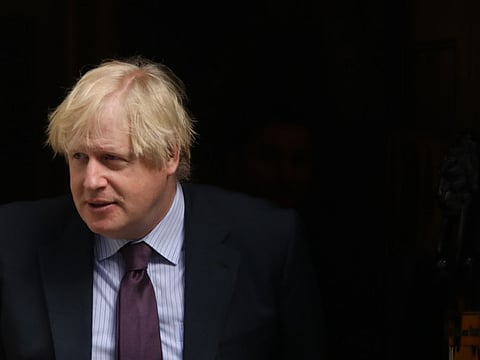Theresa May likes a toothless Boris Johnson
The permanently ambitious foreign secretary remains the British Prime Minister’s chief potential rival

Boris Johnson is incapable of flying below the radar. So the cancellation of his visit to Moscow recently, which would barely have been noticed if Britain possessed a greyer foreign secretary, is being seen by some as another career crisis for this emotionally neediest of politicians. True, it is a tad embarrassing for the foreign secretary to be pulled off the plane to Russia as if he was some surplus United passenger on an overbooked flight. But let’s not exaggerate it by being wedded to the worn-out narrative that everything that Johnson does is always either fascinating or important.
More significant than the postponed Russia trip, in many ways, is Johnson’s semi-isolation from more cautious G7 foreign ministers in their talks in Lucca over how to approach Vladimir Putin’s Russia in the aftermath of the Assad regime’s Sarin attack in Idlib. Once again, the US and Britain have persuaded themselves of an ambitious course of action — weakening or even breaking the Putin-Assad link — the results of which other allies are less sanguine about. Johnson has also invested personally in trying to tighten the financial sanctions on those around Putin. But, as always happens with Johnson, all this will expose him to further ridicule from his critics in the media and in politics — some of whom fawned on his every appearance until last summer, when they belatedly tumbled to the terrifying prospects entailed in a possible Johnson premiership.
Some of this preoccupation with Johnson at such a supremely volatile and complex moment in international affairs is unfair. Johnson’s retreat from Moscow — at least Napoleon got to the Russian capital before making his U-turn — reflects pre-existing domestic and international political realities that have little to do with Johnson or his style. Reality number one is that the US is the boss of the western alliance. In the aftermath of the Trump administration’s own spectacular U-turn on Syria (and thus on Russia, which is Syria’s main backer), Washington needed to exert control — including over itself — in a confused and uncertain situation. The cancellation, and the Lucca talks, were an attempt to get the Trump administration’s and the west’s ducks in a row, and to ensure that Secretary of State Rex Tillerson, and no one else, took the message to Moscow.
That’s not primarily an insult to Johnson. It’s just the realities of power — plus the second-order reality that Tillerson conducts himself like a man with power while Johnson does not. Reality number two is that British foreign secretaries are not in charge of British foreign policy anyway. British prime ministers are their own foreign secretaries now, and have been since at least Margaret Thatcher’s time. Foreign secretaries do the secondary stuff in between the big meetings and the phone calls that matter, which involve heads of government. Russia is at, or close to the top of the list of issues that matter to Britain in security terms, with very good reason, so it’s inevitably one where the PM sets the tone.
So when Theresa May told Johnson (as I assume she did) that this was not the time to go to Moscow, he had to concede. Reality number three, therefore, is that the cancellation of Johnson’s visit to Moscow should not be over-interpreted. It is not a collective panic in the chancelleries of the west that Johnson might make some inappropriate joke about Putin’s chest muscles or Soviet-era female shot-putters at a time of heightened political tension. Or if it is, it is surely understandable. For what it’s worth, the word in Downing Street these days is that Johnson and May are working better than they were at the outset last summer. In one sense, that’s hardly surprising either, since the initial shock value of Johnson’s appointment has taken a long time to settle — not least after Johnson’s stupid early remarks about Italy and Turkey — and it isn’t entirely settled yet.
But there remain big differences between the prime minister, who is conscientious and hardworking to a fault, and her foreign secretary, who has a record of being lazy and winging it. It would be pretty surprising, and pretty naive too, if May possessed enormous confidence in Johnson. There is no strong evidence that she relies on him on big things. Her visit to Saudi Arabia recently was presumably, in part, an effort to smooth any ruffled feathers that remained after Johnson’s previous comments.
On the other hand, May appreciates Johnson’s role in making the early links with the Trump administration. But the main reason why May is happy with Johnson being where he is concerns domestic politics. The permanently ambitious Johnson remains May’s chief potential rival. With Brexit now beginning to take shape, she wants him in the government tent, not outside it. She wants him to sign in blood to the Brexit deal that she (Johnson won’t be allowed anywhere close to the talks) is trying to negotiate. She absolutely does not want him to resign and accuse her of betraying the Brexit cause. Happily for May, the signs, for the moment, are that Johnson doesn’t want that either.
Guardian News & Media Ltd, 2017


